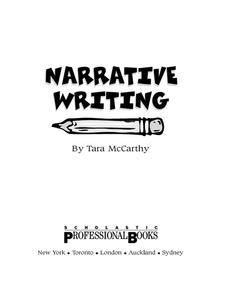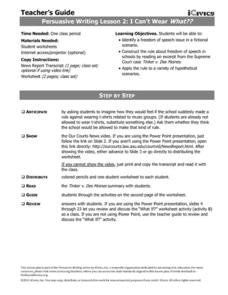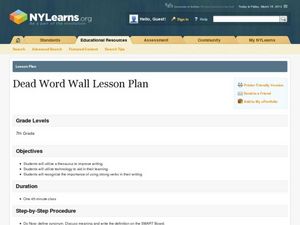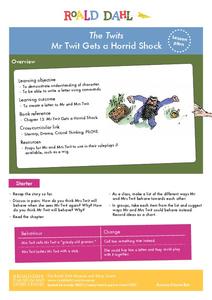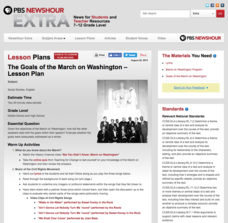Santa Monica-Malibu Unified School District
Parts of Speech Pronouns: Building Blocks of Grammar
Pronouns are the most helpful parts of speech! Model the ways that interrogative, indefinite, personal, and demonstrative pronouns can specify meaning and enhance writing with a hands-on activity.
Santa Monica-Malibu Unified School District
Parts of Speech Adjectives: Building Blocks of Grammar
How do you describe a jellyfish? Individuals write adjectives for Nomura's jellyfish, take notes, and check understanding with a formative assessment. Notes include the definition for adjectives, guiding questions to help writers...
University of California
The Civil War: Lincoln’s Speeches
Abraham Lincoln is responsible for uniting the states during the most tumultuous periods in American history, and for his elegant oratory that kept the Union believing in its cause. Young histoians analyze various speeches by America's...
Scholastic
Narrative Writing
If you're looking to start a unit based around narrative writing, make sure to consider this resource while you're planning. This book covers five topics: writing personal narratives, writing narratives about others, writing narratives...
EngageNY
Reading Closely and Introducing Rhetoric Toolbox: Unions as Agents of Change—Part 1
Scholars explore the question of whether labor unions are the agents of change as they continue reading César Chávez's 1984 speech, "Address to the Commonwealth Club of California." They discuss rhetoric in Chávez's speech and discover...
EngageNY
Speech Structure: Unions as Agents of Change— Part 2
Scholars continue reading César Chávez's 1984 speech, "Address to the Commonwealth Club of California." Working with partners, they complete graphic organizers to determine a claim that Chávez makes about the UFW.
EngageNY
Speech Structure: Part 2 of the Commonwealth Club Address
Scholars continue reading and analyzing César Chávez's 1984 speech, "Address to the Commonwealth Club of California." Working with partners, they answer text-dependent questions about how governments and consumers affect working...
Curated OER
The House
Oú est la cuisine? Several activities are suggested here to develop and further vocabulary acquisition for your beginning French speakers. They draw pictures of different rooms in a house and place objects around the room. Then, using...
iCivics
I Can’t Wear What?
Can schools ban t-shirts picturing musical groups or bands? Your young citizens will find out with this resource, which includes a summary of a United States Supreme Court case from the 1960s about a similar dispute over students wearing...
Curated OER
Writing a Newspaper Article
The perfect resource for a beginning journalism teacher or someone designing a journalism unit, this activity prompts young scholars to write a newspaper article. It covers all aspects of the writing process, such as a guided warm-up...
Curated OER
Dead Word Wall Lesson
Help your writers eliminate "dead words" (words that are overused) from their writing. This lesson includes a SMART board presentation that will guide them through identifying, eliminating, and substituting "dead words" from sample...
Roald Dahl
The Twits - Mr Twit Gets a Horrid Shock
Mr. and Mrs. Twit do not treat each other very nicely. The sixth lesson plan in an 11-part unit designed to accompany The Twits by Roald Dahl explores the way the characters talk to and treat one another. Role play and writing activities...
PBS
The Goals of the March on Washington
Who else had a dream other than Martin Luther King, Jr.? Pupils explore civil rights leaders in a fourth lesson out of a series of five about people who paved the way to freedom for African Americans. The inquiry-based unit has your...
National Endowment for the Humanities
Chronicling America: Uncovering a World at War
As part of a study of World War I, class members read newspaper articles from the time that urge American involvement, non-involvement, or neutrality. Using the provided worksheet, groups analyze the articles noting the central argument...
PBS
The March on Washington and Its Impact
High schoolers read Martin Luther King, Jr's speech that he gave in Washington. They identify the social conditions that led to the civil rights movement. They discuss the significance of the March on Washington.
Library of Virginia
Life as an Enslaved People
As part of a study of slavery in the United States, class members analyze documents related to the sale of slaves. They consider not only the text of the bills of sale but also what the appearance of the broadsides suggest.
Curated OER
Immigration Debates in the Era of "Open Gates"
Young social historians examine immigration debates of the early 20th century through primary sources, such as political cartoons. They analyze the material, discuss their findings, and complete a critical thinking worksheet. All...
City University of New York
Urban Politics: Machines and Reformers
Take a trip to the turn of the twentieth century with a resource about industrialism in America. With primary source documents and focus questions, learners think about the ways that government groups and organizations paved the way for...
Anti-Defamation League
Who is Malala Yousafzai?
Malala Yousafzai may be young, but she's mighty! Young scholars listen to a short lecture about Malala's background, read an article about her winning the Novel Peace Prize, and meet in groups to discuss statements she has made. Class...
Stanford University
Martin Luther King, Jr. and Malcolm X: A Common Solution?
Much has been made of the differences between Martin Luther King, Jr. and Malcolm X. But was there any common ground between them? Class members reconsider what they think they know about these two civil rights leaders with biographical...
Bully Free Systems
Bully Free Lesson Plans—Seventh Grade
Having a hard time defining bullying with your seventh graders? Discuss the different types of behavior one would see in a bullying situation with a series of lessons, worksheets, and group activities.





